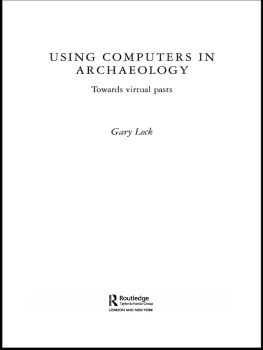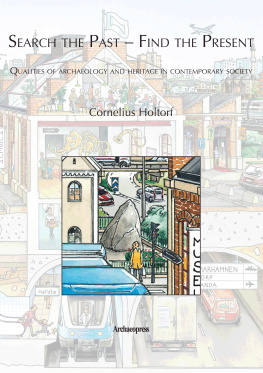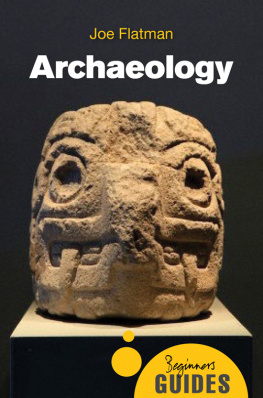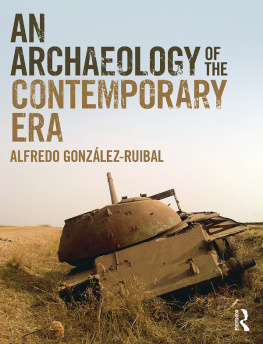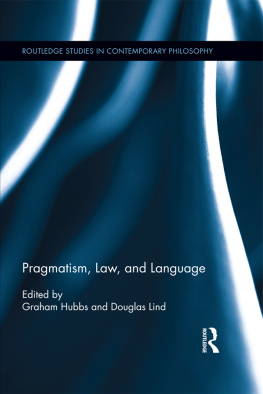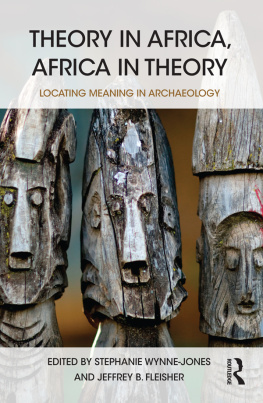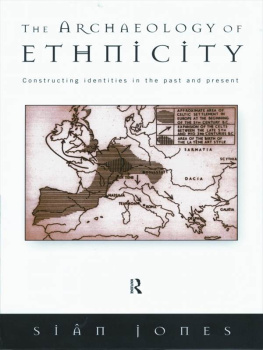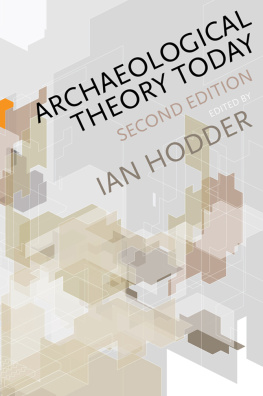
This second edition first published 2010
2010 Blackwell Publishing Ltd except for editorial material and organization
Robert W. Preucel and Stephen A. Mrozowski
Edition history: Blackwell Publishers Ltd (1e, 1996)
Blackwell Publishing was acquired by John Wiley & Sons in February 2007. Blackwells publishing program has been merged with Wileys global Scientific, Technical, and Medical business to form Wiley-Blackwell.
Registered Office
John Wiley & Sons Ltd, The Atrium, Southern Gate, Chichester, West Sussex, PO19 8SQ, United Kingdom
Editorial Offices
350 Main Street, Malden, MA 02148-5020, USA
9600 Garsington Road, Oxford, OX4 2DQ, UK
The Atrium, Southern Gate, Chichester, West Sussex, PO19 8SQ, UK
For details of our global editorial offices, for customer services, and for information about how to apply for permission to reuse the copyright material in this book please see our website at www.wiley.com/wiley-blackwell.
The rights of Robert W. Preucel and Stephen A. Mrozowski to be identified as the authors of the editorial material in this work have been asserted in accordance with the UK Copyright, Designs and Patents Act 1988.
All rights reserved. No part of this publication may be reproduced, stored in a retrieval system, or transmitted, in any form or by any means, electronic, mechanical, photocopying, recording or otherwise, except as permitted by the UK Copyright, Designs and Patents Act 1988, without the prior permission of the publisher.
Wiley also publishes its books in a variety of electronic formats. Some content that appears in print may not be available in electronic books.
Designations used by companies to distinguish their products are often claimed as trademarks. All brand names and product names used in this book are trade names, service marks, trademarks or registered trademarks of their respective owners. The publisher is not associated with any product or vendor mentioned in this book. This publication is designed to provide accurate and authoritative information in regard to the subject matter covered. It is sold on the understanding that the publisher is not engaged in rendering professional services. If professional advice or other expert assistance is required, the services of a competent professional should be sought.
Library of Congress Cataloging-in-Publication Data
Contemporary archaeology in theory: the new pragmatism /[edited by] Robert W. Preucel and
Stephen A. Mrozowski. 2nd ed.
p. cm.
Includes bibliographical references and index.
ISBN 978-1-4051-5832-9 (hardcover: alk. paper) ISBN 978-1-4051-5853-4 (pbk.: alk. paper)
1. Archaeology. I. Preucel, Robert W. II. Mrozowski, Stephen A.
CC173.C66 2010
930.1dc22
2009054212
Preface
If edited books are collaborative projects, edited Readers are even more so. Throughout the process of organizing and writing this Reader, we have explored our own deeply held commitments and challenged each other to broaden our horizons. Given our backgrounds in prehistoric and historical archaeologies, we were particularly intrigued by the idea of breaking down these categories and exploring the implications of deep time and the search for a deeper history. In addition, we both have considerable experience working with Native American communities and are strong advocates of indigenous archaeologies. We are both committed to increasing the numbers of Native American archaeologists as well as transforming our profession in ways that acknowledge the rights and interests of Native American peoples. In many ways, our collaboration has been and continues to be a transformative process. We would be remiss, however, if we didnt thank the person who brought us together, namely Craig Cipolla. Craig was a Masters student with Steve at the University of Massachusetts at Boston and is currently a doctoral candidate with Bob at the University of Pennsylvania. Craigs interest and enthusiasm for all things theoretical helped to spark discussions between us that led to our collaboration on this book.
We are especially grateful to the individual authors who have agreed to allow their publications to be reprinted in our book. They have been extremely supportive and generous without any knowledge of exactly how we would represent their work. We have chosen to use their writings to provide a context for exploring the articulation of different theories and their real-world applications and consequences. But, in the end, these chapters must stand on their own. They were not produced for this Reader, but rather for different contexts a specific book, a given journal article, a particular interview. We have extracted them for our purposes and used them to make specific points about what we are calling the new pragmatism, the increasing professional commitment to the practice of socially relevant archaeology. But because of their preexistence, they retain the ability to talk back and actively resist the interpretations we offer. This quality can be understood as their partial objectivity.
We thank Rosalie Roberston at Wiley-Blackwell for her strong commitment to this project. Rosalie has been extremely patient, and always understanding with several unavoidable delays. We thank Julia Kirk for skillfully steering us through the various stages of the production process. Finally, we thank Justin Dyer, our copy-editor, for his superb attention to detail.
Each of us has had a deep interest in theoretical questions during the course of our careers. Throughout that journey we have been influenced by our peers, our students, and our mentors. Each of us has incurred special debts we would like to acknowledge. Bob would like to thank Asif
Agha, Herman Agoyo, Woody Aguilar, Wendy Ashmore, Ofer Bar-Yosef, Alex Bauer, Alexis Boutin, K. C. Chang, Christopher Chippindale, Craig Cipolla, Meg Conkey, Linda Cordell, Ann Dapice, Terry Deacon, Harold Dibble, Tim Earle, Roger Echo-Hawk, Clark Erickson, T. J. Ferguson, Kathy Fine-Dare, Richard Ford, John Fritz, Yosef Garfinkle, Pamela Geller, Joan Gero, Chris Gosden, Richard Grounds, Suzan Harjo, Julie Hendon, Michael Herzfeld, Jim Hill, Ian Hodder, Mark Johnson, Matthew Johnson, Rosemary Joyce, Sergei Kan, Webb Keane, Mark Leone, Richard Leventhal, Matt Liebmann, Randy McGuire, Desire Martinez, Randy Mason, Frank Matero, Lynn Meskell, Barbara Mills, Koji Mizoguchi, Melissa Murphy, Simon Ortiz, Tom Patterson, Tim Pauketat, Robert Paynter, Steve Pendery, Bernie Perley, Colin Renfrew, Uzma Rizvi, Diego Romero, Mateo Romero, David Rudner, Jeremy Sabloff, Dean Saitta, Bob Schuyler, Rus Sheptak, Tad Shurr, Michael Silverstein, Daniel Smail, Monica Smith, Laurajane Smith, James Snead, Edward Soja, Matthew Spriggs, Miranda Stockett, Joseph Suina, Greg Urban, Joe Watkins, Mike Wilcox, Gordon Willey, Lucy Williams, Alison Wylie, and Larry Zimmerman.
Steve wishes to thank Ping-Ann Addo, Susan Alcock, Douglas Armstrong, Christa Baranek, Mary Beaudry, William Beeman, Douglas Bolender, Joanne Bowen, Kathleen Bragdon, Marley Brown, Eleanor Casella, Craig Cipolla, Meg Conkey, Christopher DeCorse, Jim Deetz, James Delle, Amy Den Ouden, Roger Echo-Hawk, Arturo Escobar, Maria Franklin, Jack Gary, Rae Gould, Richard Gould, Martin Hall, David Harvey, Kat Hayes, Ian Hodder, Audrey Horning, Dan Hicks, Matthew Johnson, Martin Jones, Rosemary Joyce, Kenneth Kvamme, David Landon, Heather Law, Henri Lefebvre, Mark Leone, Kent Lightfoot, Lynn Meskell, Barbara Little, Kevin McBride, Thomas McGovern, Randy McGuire, Richard McNeish, Jose Martinez-Reyes, Christopher Matthews, Kathleen Morrison, Daniel Mouer, Paul Mullins, Michael Nassaney, Charles Orser, Marilyn Palmer, Gisli Palsson, Tom Patterson, Tim Pauketat, Robert Paynter, Guido Pezzarossi, Virginia Popper, Colon Renfrew, Krysta Ryzewski, Dean Saitta, Ken Sassman, Peter Schmidt, Bob Schuyler, Paul Shackel, Stephen Silliman, Theresa Singleton, James Snead, Edward Soja, John Steinberg, Christopher Tilley, Heather Trigg, Bruce Trigger, Diana Wall, Joe Watkins, Michael Way, Laurie Wilkie, Christopher Witmore, LouAnn Wurst, and Judith Zeitlin.
Next page

